Shabbir Ahmed
OCTOBER is going to be an important month for Pakistan’s economic outlook. The Global Financial Action Task Force (FATF) is going to review Pakistan’s action plan to curb money laundering and terror financing. Pakistan was grey listed by FATF in June 2018 after much pressure from different countries. Countries with domestic laws that are weak to tackle money laundering and terrorism financing are included in the grey list. FATF had warned Pakistan in June this year to meet its commitment by October or face consequences. Pakistan has already failed to garner support from the regional sub-group ie the Asia-Pacific Group of the global FATF. The body has already placed Pakistan on ‘Enhanced Expedited Follow-Up List’ (blacklist) for failing to meet the requirements. It has made the country’s case much more difficult during FAFT review in October.
Money laundering has remained one of the major problems for developing countries like Pakistan over the years. According to the United Nations Office on Drugs and Crime, money launderers scrub as much as $2 trillion (or 5 percent of the world’s GDP) every year. Economists are of the view that money laundering not only damages the financial-sector institutions of a country that are critical to economic growth but also reduces productivity in the economy’s real sector by diverting resources and encouraging crime and corruption, which ultimately slow economic growth, and can distort the economy’s international trade and capital flows to the detriment of long-term economic development. It has happened in Pakistan. Money laundering can also be associated with significant distortions to a country’s imports and exports. It is also common in Pakistani market. Smuggling of different commodities from and to neighbouring countries is not uncommon here. On the import side, criminal elements often use illicit proceeds to purchase imported luxury goods, either with laundered funds or as part of the process of laundering such funds. Such imports do not generate domestic economic activity or employment, and in some cases, it can artificially depress domestic prices, thus reducing the profitability of domestic enterprises.
Strong financial institutions such as banks, non-bank financial institutions and equity markets are critical to economic growth. Such institutions allow for the concentration of capital resources from domestic savings and the efficient allocation of such resources to investment projects that generate sustained economic development. Money laundering not only erodes financial institutions themselves but also within these institutions, there is often a correlation between money laundering and fraudulent activities undertaken by employees. Moreover, investors’ trust is fundamental to the growth of sound financial institutions, and the perceived risk to depositors and investors from institutional fraud and corruption is an obstacle to such trust. Majority of global investigations focus on two prime money-laundering industries: Drug trafficking and terrorist organizations. FATF is particularly looking into these aspects. That is the reason that it has put certain countries in the grey and black lists. Effect of successfully cleaning drug money is clear: More drugs, more crime, more violence. However, connection between money laundering and terrorism may be a bit more complex, but it plays a crucial role in the sustainability of terrorist organizations. Most people who financially support terrorist organizations send the money in roundabout ways to allow them to fund terrorism while maintaining anonymity.
Money laundering can take different forms. Cash smuggling is one of the oldest methods used for general smuggling of currency. The bulk shipments of cash hidden in cargo are driven across the border, though it is illegal to export a bulk amount of cash. Offshore accounts are often used by criminals to obscure the audit trail as many different countries in the world offers strictly law for bank secrecy to attract money in their countries. Panama Papers revealed offshore accounts of many renowned people throughout the world including Pakistan. Many of the so-called tax heaven countries also attract clients by selling Shell banks which means a bank which is incorporated in jurisdiction in which the bank has no physical presence and also unaffiliated with the regulated financial institutions. A customer only needs a false name to open an account which provides the customer complete secrecy and protects him from investigation and possible prosecution.
Laundering through trade involves under or over-valuing invoices to disguise the movement of money. Hundi is also a major channel of money laundering in Pakistan. Overseas nationals send remittances to their relatives and friends through Hundi. It works as a credit transfer, and transfers money without actually moving it from one region to another. Foreign exchange companies use this process to hide their taxable earnings from government. Cash flow through different bank accounts is a signature move in Pakistan and several other developing countries. Last year, Pakistani authorities discovered several accounts in the name of poor people that had been flooded with cash, then suddenly emptied. Pakistan’s Supreme Court established a Commission in September to investigate the claims, finding that at least US$400m had passed through several of false accounts. In a country like Pakistan, money laundering in any form can severely hamper the economy. Government and civil society need to join hands to counter this menace. Existing laws need to be revised keeping in view the newly developed ways of money laundering. Implementation of those laws is also of utmost importance. It will not only strengthen the economy but also improve Pakistan’s image in the global arena.
—The writer is freelance columnist.










